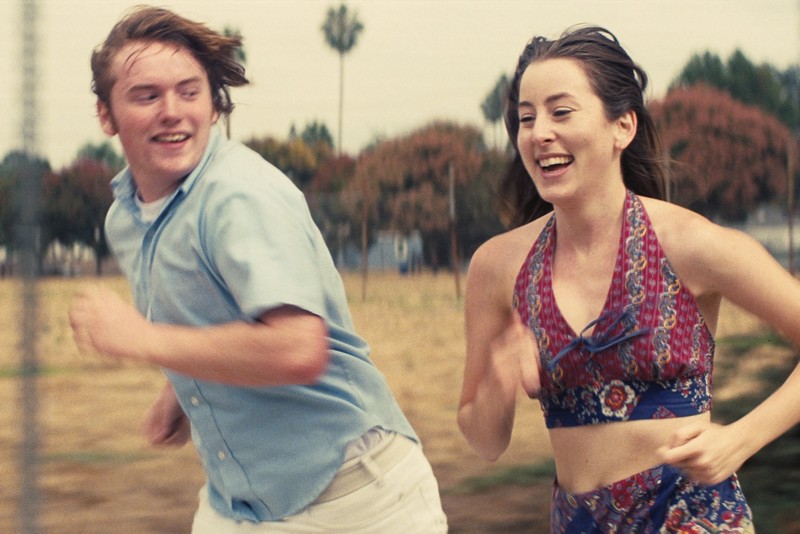Few directors have as formidable a reputation as Paul Thomas Anderson. Magnolia, There Will Be Blood, The Master, Phantom Thread – his films deal in big themes in majestic ways. So his latest, Licorice Pizza, might seem a change of pace for him. After all, this could be seen as a rom-com – complete with meet-cute, second act obstacle and charming ending. But Anderson isn’t content making a “mere” rom-com; because Licorice Pizza is also a sprawling love letter to Los Angeles in the 1970s. Oh, and a paean to impossible relationships.
The film has some parallels to Quentin Tarantino’s Once Upon a Time… in Hollywood, which evoked the Hollywood of the late ’60s. Anderson even includes a cheeky nod to Tarantino (or maybe Mike Nichols?). But while QT’s film was all about the movies, PT’s has rather broader scope. If you know the lingo from those times, you might be aware that a “licorice pizza” is a vinyl record. It was also the name of a chain of LA record stores that flourished in the ’70s. So naturally the music of the time plays a huge part. But Anderson delves into politics, the movies, fads and social mores. The result is a typically Andersonian epic of vast scope but with a more intimate and joyful feel to it.

The film’s through-line is the relationship between Alana Kane (Alana Haim) and Gary Valentine (Cooper Hoffman). She’s 25; he’s 15. But she’s awkward and naive, while Gary is a former child star (a recurring character type in Anderson’s films) who’s wise beyond his years. Gary’s also smart. When he encounters water-beds (that archetype of the era) for the first time, he sets out to create a business selling them. Alana joins as his business partner – but it’s the ’70s, so no one takes her seriously because she’s a woman. Through the business, they meet Barbara Streisand’s boyfriend, the manic Jon Peters (Bradley Cooper). Gary also tries to make a killing when he learns pinball machines will be legalised in California.
But Alana doesn’t want to sell water-beds and pinball machines. She wants to be an actor. An audition leads to a date with action movie star Jack Holden (Sean Penn) – but the evening ends disastrously. Alana also discovers politics and joins the campaign for charismatic mayoral hopeful Joel Wachs (Bennie Safdie).
That’s very much a thumbnail sketch of Anderson’s vast panorama. In one sense, the plot itself doesn’t really matter, just as it didn’t matter in the Tarantino film. Anderson is far more interested in evoking a time and place – perhaps even a feeling – rather than ticking off plot points. The film runs for 133 minutes, and I’d guess 33 of those feature the central love story. The remainder is a series of digressions (or maybe the rom-com is the digression?) exploring life in the San Fernando Valley.
Anderson (who also wrote the screenplay) sets his film at a very specific time – the summer of 1973. That summer is remembered as the last gasp of a vaguely-defined American innocence. Having weathered the Manson killings two years earlier, the nation was in facing two other threats – the 1973 oil crisis and Watergate. The oil crisis is explicitly referenced in the film, but Watergate only obliquely. The more explosive revelations of the Watergate hearings were still to come, followed by President Nixon’s resignation. Those events marked the end of any mythos around American exceptionalism or moral superiority. They forced the nation to confront some uncomfortable truths. Viewed through that lens, the film’s apparently heartwarming ending might portend more difficult times for its protagonists.
While the record stores apparently inspired the title, it also hints at the film’s theme of impossible relationships. Licorice and pizza are two things that should never go together. Similarly, the age difference between Alana and Gary – not to mention the fact he’s a minor – make their relationship just as fraught (not to mention, if it weren’t so chaste, illegal). You have to wonder why Barbra Streisand and would stay with the boorish Peters (even though he’s a heavily fictionalised version of the real person). And Wachs has to face impossible choices in his own relationship as he runs for office.
Licorice Pizza is littered with extraordinary moments. A rollercoaster ride down steep streets in a truck is a memorable highlight. A long set-piece during Alana’s date with Jack Holden (who seems to be a Steve McQueen analogue) delivers both at the time and in call-back. And the scenes involving Alana’s family take on an extra frisson when the credits reveal the other actors are Alana Haim’s real family.
Haim (best known as a musician in the band Haim) and Cooper Hoffman (son of the late, great Philip Seymour Hoffman) both make their feature film debuts, but you’d never know it. The pair deliver powerhouse performances that belie their inexperience. They more than match it with veterans like Sean Penn. But the performances are uniformly excellent, and picking anyone out is difficult. That said, Bradley Cooper is surely bound for a best supporting actor nomination for his unrestrained turn as Peters.
Licorice Pizza is another triumph for Paul Thomas Anderson. While it might not have the gravitas of say There Will Be Blood, he’s just as adept with the lighter tone of this film. My tip is just to allow this marvellous film to wash over you.
David Edwards
Other reviews you might enjoy:

David Edwards is the former editor of The Blurb and a contributor on film and television






One thought on “Licorice Pizza – movie review”
Comments are closed.